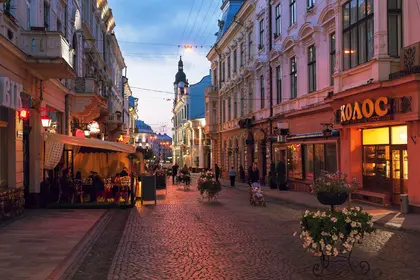Warring Ukraine begins in Romania. Romanian border roads are clogged with trucks loaded with weapons. Missiles? Howitzers? Radars? They hide their nationality in containers under heavy khaki fabric.
Trucks give way to a bus with half a dozen poets from Germany, Israel, and Switzerland. We are going to Chernivtsi to read poems. There is a tradition here of reading poems in autumn. Not all the poets invited agreed to come because of the turbulent times. We are warned, “There might not be water in the city. Curfew starts at 11 p.m.”
JOIN US ON TELEGRAM
Follow our coverage of the war on the @Kyivpost_official.
We travel from the city of Iasi to Chernivtsi, five and a half hours by bus. Finally, we arrive. Water is available. Our hotel is in the pedestrian zone in Olha Kobylianska Street. “Make yourself at home. It’s safe here.”
In the morning, I’m woken up by the sound of soldiers’ footsteps and the commander’s shout, “Glory to Ukraine!” The soldiers answer, “Glory to the Heroes!” There is a territorial defense barrack near our hotel. It turns out that the guests here are also a military object in some respects.
We walk around the city. There’s a sign on the gate of the military hospital, “Department of Disaster Medicine.” Two years ago, there was no such a sign here. We read an announcement on the gate of the park, “In the Summer Theater we are weaving ‘kikimora’ camouflage gear for our soldiers.”
There are many advertisements in the city. In the yard of the music school, an arrow is drawn on a piece of paper, “Bomb shelter 150 meters away.” The address of the nearest bomb shelter is also written on the door of the Paul Celan Poetic Center.
All the signs and ads are in Ukrainian. It is everywhere. It seems that Russian has been turned off in this polyglot city. Only refugees from Kharkiv and Mariupol speak Russian. I ask what language the soldiers at the front speak. They say that they speak Ukrainian and Russian, but at night everyone switches to Ukrainian so as not to be mistaken for the enemy.
I enter a small restaurant surrounded by greenery – more paradise than a restaurant. The heavenly menu includes two types of wine: Pinot Grigio and Chianti. Leonard Cohen sings indifferently about a thousand deep kisses.
I buy some local newspapers. They print many obituaries, especially the Molody Bukovynets: “The children were left without a father”; “He was an example for his brothers.” Fresh graves with photographs of soldiers appear in the city cemetery. Glory to the Heroes!
In the park, I pass a small pavilion of computer games. There’s writing in capital letters on the wall, “Will help you free yourself from reality.” Should I go in?
In the evening, a German poetess reads some poems. A Germanic language philology professor from Chernivtsi translates. While reading, the poetess starts to cry. The professor gets confused and keeps silent. The audience is also crying. At the end of the evening, a woman approaches the poetess and says, “Thank you for your tears.”
In the fall of 2022, German free verse and Ukrainian weeping come together in Chernivtsi.
You can also highlight the text and press Ctrl + Enter




